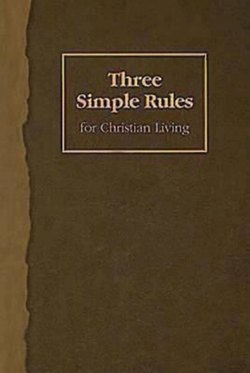Читать книгу Three Simple Rules for Christian Living - Rueben P. Job - Страница 14
На сайте Литреса книга снята с продажи.
Reflect
ОглавлениеHow do the questions in this paragraph affect your awareness of harm caused by groups or institutions? How might you unwittingly be part of the group?
Of course, these questions work on the individual level. We may note that we are harming ourselves by not taking care of our health or not being good stewards of our resources. We may be harming our neighbors and coworkers by gossip and character defamation. We may be harming our families by neglect or poor communication. Once we identify the harm we do, we are empowered to be more vigilant not to do it.
If John Wesley were living in the 21st century, I believe he would be reading widely, seeking to understand not only religion but also economics, sociology, globalization, science, medicine, international relations, arts, and literature. He would constantly be looking for connections among all these subjects in order to make sense of culture and the human condition, especially human suffering. He would want to know where harm is being done and what he and "the people called Methodists" could be doing to stop it.
Wesley believed Christian discipleship was chiefly a matter of loving God and neighbor, a matter that could not be separated from seeing where and how the neighbor was being harmed. In Wesley's view, God is "the Proprietor" of creation and we human beings are stewards.3 Our bodies, our capacity to work, and indeed the created order belong to God; and God entrusted them to us. We may have used our energies and skills to buy property, but the property and the profit that comes from it belong to God. We are accountable to God for everything that is entrusted to us—talent, time, resources of nature, skills, and the tools of our trade.4
A student once complained to me that she didn't like the written prayers in Sunday worship services. After all, they weren't about her. She didn't like the idea of confessing something that she didn't do. No one had ever taught her that the prayers of worship are the prayers of the Christian community or that the Lord's Prayer begins with "Our Father," not with "My Father," and that in it "we" pray for "our daily bread" and "we" ask that "our trespasses" be forgiven. We may have grown up in families or churches where sin was entirely individual. We were taught that as individuals we should not steal or lie or covet, but hardly anyone ever mentioned the sin of collections of people—corporations, institutions, and other groupings. That's why the questions about harm need to begin in a more comprehensive way that helps us to see the harm.
When we open our eyes to the harm done, we see much—the hungry, the exploited, the jobless, the people who work for much less than a living wage, the children who lack health care, the sexually abused, the forgotten, the lost, the last, and the least. We see environmental harm— endangered species, careless use of nonrenewable resources, pollution, and global warming. And then when we ask who is doing this, if not directly, at least indirectly, we also need to ask: Are we in any way a part of that collective group; and if so, how can we stop the harm? Are we invested, either monetarily or emotionally, in efforts that cause harm? These are hard questions to ask, but if we don't ask them, we are missing the point of Christian discipleship.
